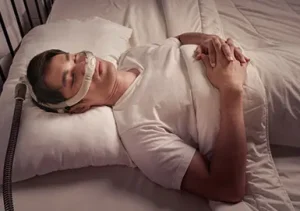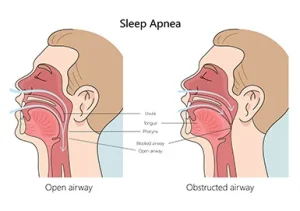Sleep apnea is a serious and commonly seen sleep disorder in an individual, where breathing repeatedly starts and stops. Each pause may last for a few seconds to a few minutes. If an individual snores loudly or even after a full night of sleep feels tired, the chances of sleep apnea are higher. This disorder is more commonly prevalent in men than women. Sleep apnea is often a treatable sleep disorder. It can ease the symptoms and help to prevent certain heart-related problems and other complications. You are prone to develop diabetes, heart disease, stroke, and obesity if sleep apnea is left untreated. There are 3 major types of sleep apnea:
- Obstructive Sleep Apnea (OSA)
- Central Sleep Apnea (CSA)
- Complex Sleep Apnea Syndrome
 Symptoms of sleep apnea
Symptoms of sleep apnea
- Loud snoring
- Inability to sleep (insomnia)
- Headache in daytime
- Fatigue
- Irritability
- Sleepiness during day time (Hypersomnia)
- Shortness of breath
- Initiation of sore throat or a dry mouth during sleep
- Lack of attention
- Feeling lethargic
- Mood swings or depression
Causes of sleep apnea
- Smoking
- Alcohol consumption
- Obesity
- Aging
- Being male
- Family history of sleep apnea and deviated septum
- The large size of the neck, tonsils, or tongue
- Low-hanging soft palate
- Type 2 diabetes
- Sleeping on your back
 How sleep apnea is diagnosed?
How sleep apnea is diagnosed?
The first step of sleep apnea treatment is undergoing a diagnostic test. Medical professionals use the STOP-BANG score to identify patients at risk of sleep apnea. If the score indicates a high risk, further evaluations such as overnight polysomnography or home sleep studies are conducted to confirm the diagnosis and determine the severity of the condition. Early diagnosis helps in planning the most effective treatment approach, such as CPAP therapy or lifestyle changes.
STOP-BANG is an acronym that stands for:
- Snoring history
- Tiredness during daytime
- Observed apnea (breathing halts while sleeping)
- High blood pressure
- BMI (Body mass index)
- Age
- Neck circumference
- Male gender
If your STOP-BANG score is high, you will be recommended for a home sleep study or polysomnography.
Sleep apnea treatments
There exist various medical interventions to manage sleep apnea, depending on the specific type and severity. Although none of them can provide a complete cure, they are effective in mitigating the frequency and severity of apnea episodes. Several treatments need to be incorporated into daily or nightly routines, to alleviate the impact of sleep apnea in one’s life. Some of the most common treatments for the disorder include:
- Conservative (nonmedical) treatments.
- Positive airway pressure and adaptive ventilation devices.
- Oral appliances (mouthpieces).
- Nerve stimulators.
- Surgery.
- Medications (only for central sleep apnea).